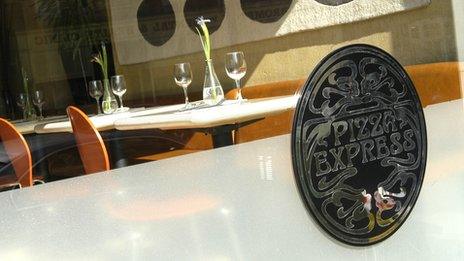Luke Johnson: The boss who likes to be very busy
- Published
.jpg)
When Luke Johnson says he "doesn't like to be idle", the serial entrepreneur certainly means it.
When you glance at his CV you wonder how he has the time to fit in all his commitments.
Mr Johnson, who is estimated to be worth £150m, is the chairman of UK private equity business Risk Capital Partners.
His current hands-on investments range from restaurant chains including Patisserie Valerie to a car park company, a cruise holiday business and even greyhound racing tracks - not to forget a bank, a research business, a marketing agency and theatre production companies.
Meanwhile, his wide-ranging charity work includes his chairmanship of the Institute of Cancer Research. And he writes business advice books.
And if that weren't all more than enough, Mr Johnson, 51, recently launched a new think tank, the Centre for Entrepreneurs, which aims to promote "the role of entrepreneurs in creating economic growth and social well-being".
Mr Johnson says: "Boredom is a great enemy in my life. I like to avoid getting bored.
"I have a restless personality, like other entrepreneurs, that keeps me going. Business is what I do, and I believe that all people need work of a sort, they need to be proactive."
'The perfect business'
To go back in time, Mr Johnson made his first fortune - and his reputation as a shrewd businessman - in the world of pizza.
It was 1993, and Mr Johnson was just 30 years old. He and Hugh Osmond, his business partner at the time, decided to take a share in a small London-based restaurant chain called Pizza Express.

Luke Johnson made his name with Pizza Express
With the help of their overdrafts and savings, the two budding young entrepreneurs managed to cobble together the funds, and persuade Pizza Express's founder that they were the right men to lead the company's expansion.
Pizza Express had just 12 branches at the time, but within six years this had increased to more than 250 across the UK. At the same time, its share price rose from 40p to more than £9.
Mr Johnson has since described Pizza Express as the "perfect business" because of pizza's enduring popularity, and its high profit margins.
But keen for a fresh challenge, Mr Johnson sold up in 1999. He then went on to own famous London restaurants such as The Ivy and Le Caprice, while launching the Strada Italian restaurant chain, which were sold in 2005 for a total of more than £90m.
Mr Johnson subsequently grew the Giraffe restaurant chain, which was sold this year to supermarket group Tesco for £50m.
He says that for someone with wide-ranging restaurant industry experience it is not too difficult to establish a winning formula.
"There are a host of things you are looking for," he says. "Try to find great partners and managers who you want to work with, people who are confident, knowledgeable and motivated.
"And find projects that are established, but not yet scaled up. I like to think that what I bring to the party is the capital, knowledge and connections that allow the business to expand significantly."
At the actual restaurant level, he says: "The properties are very important, the branch management is very important, and of course the menu and good service."
'Tough lessons'
For all Mr Johnson's success in business, which also includes six years as chairman of UK broadcaster Channel 4 from 2004 to 2010, it all could have turned out very differently. When he first went to Oxford University as an 18-year-old, he was meant to go on to become a doctor.
All that changed, however, when he and a friend started to run a nightclub evening.

Buying the Borders bookshop chain was not a success for Mr Johnson
"We had the bright idea to charge our friends entry, and that was it for me. I knew there and then that this was what I wanted to do with my life. I wanted to ultimately run my own companies."
Mr Johnson decided against continuing his medical degree and instead graduated in physiological sciences.
He then worked as a stockbroker for a number of years before ultimately taking the plunge into the world of entrepreneurship at the age of 27.
Now in his early 50s, Mr Johnson is keen to pass on his knowledge to young entrepreneurs just starting out in their business life.
Recently addressing the launch of Global Entrepreneurship Week, which in the UK is organised by the Prince of Wales's start-up support charity Youth Business International, Mr Johnson was keen to stress the importance of coping with failure.
Ill-fated purchase
Highlighting two of his own, he said "everything went wrong" when he tried to open a branch of Belgo, the mussels and frites restaurant, in New York.
"The US partner went bust, we chose the wrong location, and we neglected to use unionised labour, which you have to do in the US... Come opening night the construction union protested outside with a 25ft [7.5m] tall inflatable rat."
Mr Johnson is also happy to discuss his ill-fated purchase of the UK branches of the bookstore chain Borders, which was ultimately liquidated in 2011.
"I appeared to be able to buy it very cheaply, but my plan was doomed from the start," he says. "It was a painful experience and I lost all my money. I thought I could turn it around, but I didn't realise the extent to which Amazon, e-books and supermarkets were killing big-scale book stores."
In both cases, Mr Johnson says they are "tough lessons", and that young entrepreneurs should remember that "failures are rarely fatal".
He adds: "I would advise any young person thinking of starting their own business to take the plunge. Life is not a rehearsal, don't be the person who spends his life thinking, 'I wish I had done that'."